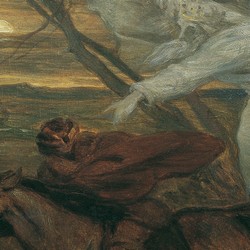
For music lovers, the year 2020 should had been Beethoven year, to celebrate the 250th anniversary of the birth of the composer. Every concert hall had its "Beethoven programme" and it was even discussed if we were paying too much attention to him. How were we supposed to know that 2020 would be the year that the concert halls closed their doors!
Slowly, music is coming back, and there will be quite a few Beethoven's works during the second week of the Schubertíada: on Wednesday 26 (today, if you’re reading this the day I'm posting) with pianist Imogen Cooper; on Friday 28 with the Cosmos Quartet and (most important for us!) the last two song recitals: on Thursday 24 with Matthias Goerne and Alexander Schmalcz and on Saturday 29 with the Kallias Ensemble.
Let's begin by talking about the second one, which offers us a little-known side of Beethoven, his arrangements of traditional songs. These works, commissioned by a Scottish publisher, should not be understood as a whim or an anomaly; apart from being really interesting from a musical point of view, they fit perfectly into the cultural context of their time. That's what I try to explain in the program of the Schubertíada but, assuming that you can't read Catalan, may I suggest that you read this shorter alternative? The Kallias Ensemble will offer a bunch of European songs, among them two that we listen some time ago: The Massacre of Glencoe, and Come fill, fill, my good fellow!
Matthias Goerne will sing Brahms, in addition to Beethoven. Te baritone chose some little-known, beautiful lieder that we didn't listen so far, and I pondered whether to share one of them here, but... it's Beethoven year, isn't it? So, let's listen to Beethoven. Since his cycle An die ferne Geliebte is well-known, and I wrote a brief introduction when we listened to its first Lied, Auf dem Hügel sitz ich spähend, this week we're listening to one song of the Gellert-Lieder, the other Beethoven's cycle that Goerne will sing.
A gentleman called Christian Gellert published in 1757 a collection of fifty-four poems, Geistliche Oden und Lieder ("Sacred Songs and Odes"); as the title indicates, the poems are of a religious nature. The book was successful, and Carl Philip Emanuel Bach set it to music (all the poems!) the following year. Beethoven was not so daring and put into music only six poems; the collection was published as Sechs Lieder nach Gedichten von Gellert, op. 48 ("Six Songs with Gellert Poems") and it's simply known nowadays as Gellert-Lieder. He composed them between 1801 and 1802 (i.e., twenty-five years before composing An die ferne Geliebte); at that time, Beethoven knew that his deafness would irremisibly get worse, and he could have sought religious consolation.
I really like the finesse with which Goerne sings this cycle, so different from his usual repertoire. As a sample and to prepare his recital in Vilabertran (if that's the case), I suggest we listen to the first song, Bitten ("Prayer"), a strophic, simple, contented Lied. Jan Lisiecki accompanies Goerne.
And that's all about the 28th Schubertíada!
Gott, deine Güte reicht so weit,
So weit die Wolken gehen,
Du krönst uns mit Barmherzigkeit
Und eilst, uns beizustehen.
Herr! Meine Burg, mein Fels, mein Hort,
Vernimm mein Flehn, merk auf mein Wort;
Denn ich will vor dir beten!
Ich bitte nicht um Überfluss
und Schätze dieser Erden.
Lass mir, so viel ich haben muss,
nach deiner Gnade werden.
Gib mir nur Weisheit und Verstand,
dich, Gott, und den, den du gesandt,
und mich selbst zu erkennen.
So bitt ich dich, Herr Zebaoth,
Auch nicht um langes Leben.
Im Glücke Demut, Mut in Not,
Das wolltest du mir geben.
In deiner Hand steht meine Zeit;
Laß du mich nur Barmherzigkeit
Vor dir im Tode finden.
God, your goodness knows no bounds
save those of the clouds in their wanderings;
you crown us with compassion
and hasten to assist us.
Lord, my stronghold, rock and refuge,
hear my prayer, attend to what I say;
for to you will I pray.
I do not ask for a superabundance
or for the treasures of this earth.
Grant me as much as I need
according to your grace.
Give me but wisdom and understanding
so that I may recognize you, O God,
and Him whom you sent and also myself.
And so I do not ask you,
O Lord of Sabaoth, for a long life.
I beg you only to give me humility
in good fortune and courage in time of need.
My life is in your hands.
Let me but find compassion
when I stand before you in death.
(translation by Stewart Spencer)

















Comments powered by CComment